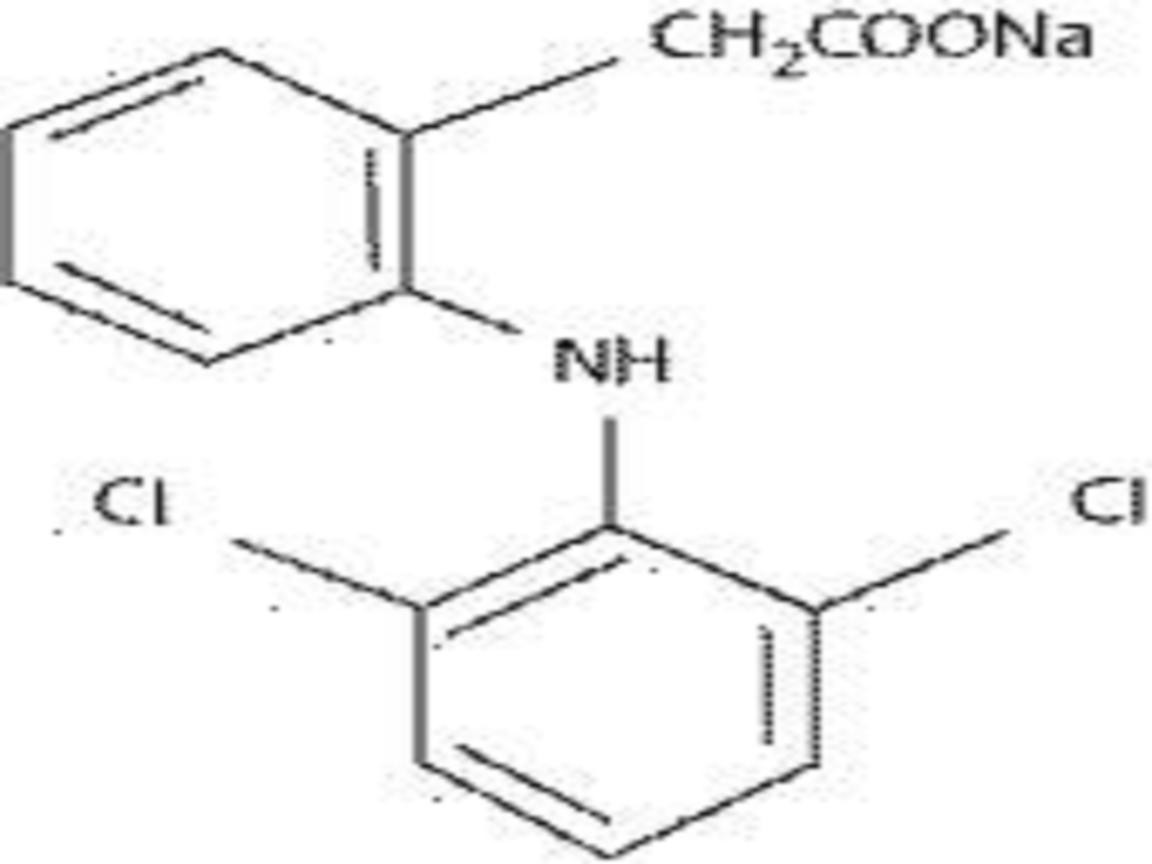Diclofenac Sodium
FULL PRESCRIBING INFORMATION: CONTENTS*
- BOXED WARNING
- DICLOFENAC SODIUM DESCRIPTION
- CLINICAL PHARMACOLOGY
- INDICATIONS & USAGE
- DICLOFENAC SODIUM CONTRAINDICATIONS
- WARNINGS
- PRECAUTIONS
- INFORMATION FOR PATIENTS
- LABORATORY TESTS
- DRUG INTERACTIONS
- PREGNANCY
- LABOR & DELIVERY
- NURSING MOTHERS
- PEDIATRIC USE
- GERIATRIC USE
- DICLOFENAC SODIUM ADVERSE REACTIONS
- OVERDOSAGE
- DOSAGE & ADMINISTRATION
- HOW SUPPLIED
- STORAGE AND HANDLING
- SPL MEDGUIDE
- PACKAGE LABEL.PRINCIPAL DISPLAY PANEL SECTION
FULL PRESCRIBING INFORMATION
BOXED WARNING
Cardiovascular Risk-
● NSAIDs may cause an increased risk of serious cardiovascular thrombotic events, myocardial infarction, and stroke, which can be fatal. This risk may increase with duration of use. Patients with cardiovascular disease or risk factors for cardiovascular disease may be at greater risk.. (SeeWARNINGS).
-
● Diclofenac sodium extended-release is contraindicated for the treatment of perioperative pain in the setting of coronary artery bypass graft (CABG) surgery (seeWARNINGS).
-
● NSAIDs cause an increased risk of serious gastrointestinal adverse events including inflammation, bleeding, inflammation, ulceration, and perforation of the stomach or intestines, which can be fatal. These events can occur at any time during use and without warning symptoms. Elderly patients are at greater risk for serious gastrointestinal events (SeeWARNINGS).
DICLOFENAC SODIUM DESCRIPTION

CLINICAL PHARMACOLOGY
PharmacodynamicsPharmacokinetics
Absorption
Normal Healthy Adults (18-48 yrs.)
Distribution
Metabolism
Excretion
Special Populations
INDICATIONS & USAGE
WARNINGSDICLOFENAC SODIUM CONTRAINDICATIONS
WARNINGS, Anaphylactoid ReactionsPRECAUTIONS, Preexisting Asthma
WARNINGS
WARNINGS
Cardiovascular EffectsCardiovascular Thrombotic Events
WARNINGS, GI Effects
CONTRAINDICATIONS
Hypertension
Congestive Heart Failure and Edema
Gastrointestinal (GI) Effects - Risk of GI Ulceration, Bleeding, and Perforation
Renal Effects
Advanced Renal Disease
Hepatic Effects
Anaphylactoid Reactions
CONTRAINDICATIONSPRECAUTIONS, Preexisting Asthma
Skin Reactions
Pregnancy
PRECAUTIONS
General
Hematological Effects
Preexisting Asthma
INFORMATION FOR PATIENTS
Patients should be informed of the following information before initiating therapy with an NSAID and periodically during the course of ongoing therapy. Patients should also be encouraged to read the NSAID Medication Guide that accompanies each prescription dispensed.WARNINGS, CARDIOVASCULAR EFFECTS
WARNINGS, Gastrointestinal Effects-Risk of Ulceration, Bleeding, and Perforation).
WARNINGS, Hepatic Effects
WARNINGS
LABORATORY TESTS
DRUG INTERACTIONS
WARNINGS, Renal Effects
PREGNANCY
LABOR & DELIVERY
NURSING MOTHERS
PEDIATRIC USE
GERIATRIC USE
DICLOFENAC SODIUM ADVERSE REACTIONS
Body As A Whole
Cardiovascular System:
Digestive System:
Hemic And Lymphatic System:
Metabolic And Nutritional:
Nervous System:
Respiratory System:
Skin And Appendages:
Special Senses:
Urogenital System:
Body As A Whole:
Cardiovascular System:
Digestive System:
Hemic And Lymphatic System:
Metabolic And Nutritional:
Nervous System:
Respiratory System:
Skin And Appendages:
Special Senses:
OVERDOSAGE
DOSAGE & ADMINISTRATION
WARNINGSHOW SUPPLIED
STORAGE AND HANDLING
SPL MEDGUIDE
Non-Steroidal Anti-Inflammatory Drugs (NSAIDs)What is the most important information I should know about medicines called Non- Steroidal Anti-Inflammatory Drugs (NSAIDs)?
NSAID medicines may increase the chance of a heart attack or stroke that can lead to death.
-
● with longer use of NSAID medicines
-
● in people who have heart disease
coronary artery bypass graft (CABG).
NSAID medicines can cause ulcers and bleeding in the stomach and intestines at any time during treatment. Ulcers and bleeding:
-
● can happen without warning symptoms
-
● may cause death
-
● taking medicines calledcorticosteroidsandanticoagulants
-
● longer use
-
● smoking
-
● drinking alcohol
-
● older age
-
● having poor health
-
● exactly as prescribed
-
● at the lowest dose possible for your treatment
-
● for the shortest time needed
-
● different types of arthritis
-
● menstrual cramps and other types of short-term pain
Do not take an NSAID medicine:
-
● if you had an asthma attack, hives, or other allergic reaction with aspirin or any other NSAID medicine
-
● for pain right before or after heart bypass surgery
-
● about all your medical conditions.
-
● about all of the medicines you take. NSAIDs and some other medicines can interact with each other and cause serious side effects. Keep a list of your medicines to show to your healthcare provider and pharmacist.
-
● if you are pregnant. NSAID medicines should not be used by pregnant women late in their pregnancy.
-
● if you are breastfeeding. Talk to your doctor.
Other information about Non-Steroidal Anti-Inflammatory Drugs (NSAIDs)
-
● Aspirin is an NSAID medicine but it does not increase the chance of a heart attack. Aspirin can cause bleeding in the brain, stomach, and intestines. Aspirin can also cause ulcers in the stomach and intestines.
-
● Some of these NSAID medicines are sold in lower doses without a prescription (over-the-counter). Talk to your healthcare provider before using over-the-counter NSAIDs for more than 10 days.
-
● NSAID medicines that need a prescription
PACKAGE LABEL.PRINCIPAL DISPLAY PANEL SECTION

Diclofenac SodiumDiclofenac Sodium TABLET, EXTENDED RELEASE
| ||||||||||||||||||||||||||||||||||||||||||||||||||||||||||||||||||||||||||||||||||||||
PLEASE, BE CAREFUL!
Be sure to consult your doctor before taking any medication!